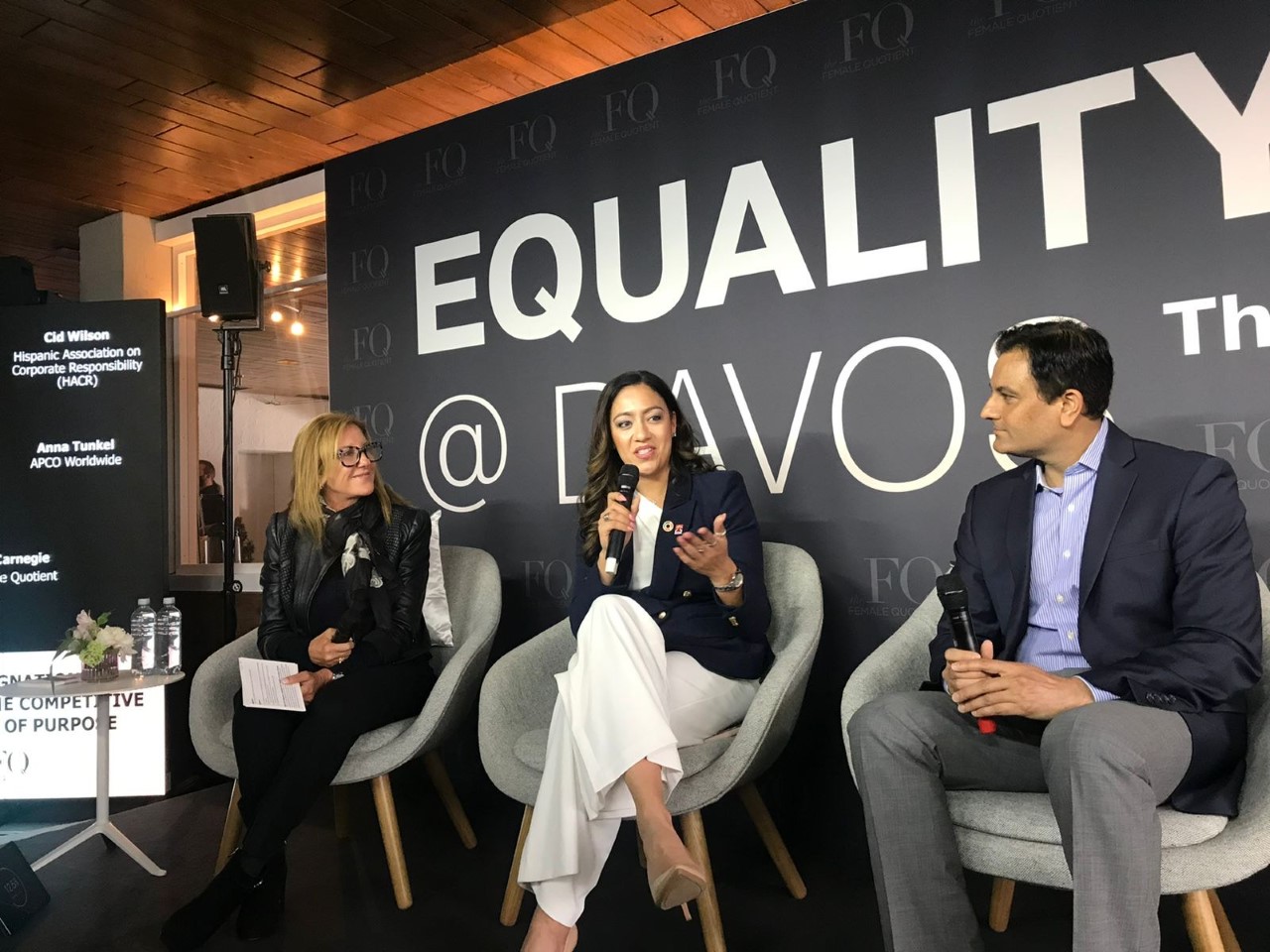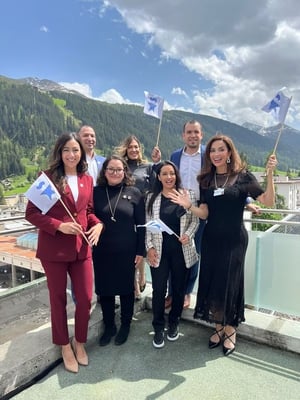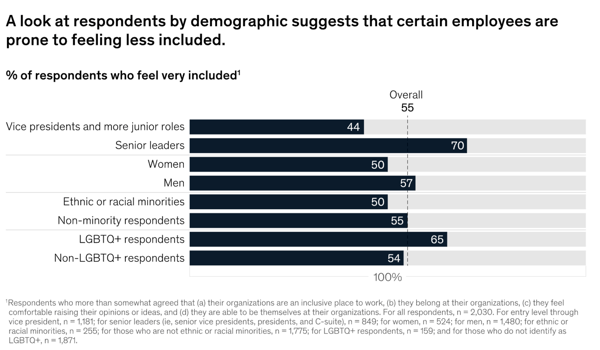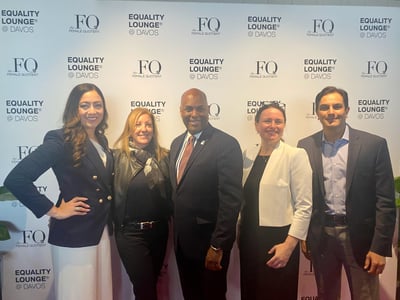
The Future of Work Must be Built with Purpose

The Hispanic Delegation Leaders, from left to right: Me, Damian Rivera, Sindy Benavides,
Stacie M. de Armas, Maryanne Piña Frodsham, Hector Mujica, and Claudia Romo Edelman.
This past week, I served as a delegate on behalf of the We Are Human Foundation and The Hispanic Star, representing the Hispanic Alliance for Career Enhancement (HACE) and my community at-large. While attending, I engaged with many global leaders and discussed topics around digital equity, cryptocurrency, the Metaverse, the Russian Ukrainian war, and the future of work.
Regarding the future of work, I spoke at the The Female Quotient #EqualityLounge at #wef22 with other business leaders on how employers can better articulate their purpose to job seekers and their communities at large. We addressed how employers can tap into purpose and meaning to gain a competitive advantage in the age of the Great Resignation.
Here are some of my key recommendations:
Purposeful Organizations Start with Making Employees Feel Included
For individuals to become effective and influential leaders, it is imperative that we understand our foundation: top values, strengths, capabilities, along with our blind-spots and biases. This level of awareness helps us build authentic relationships and resiliency. Similarly, as employers, it is imperative to do this self-reflection and assessment, but most importantly to be transparent about the challenges and accountable on how to address them. Some of the factors to assess are:
- ·Do employees feel they can be their authentic selves?
- ·Do they feel included? And if they are not feeling included, what are the steps to take to get them there?
Yet, we must be careful not to rely on these assessments 100%. It is essential to incorporate external engagement focus groups to get a more accurate pulse. While many companies are reporting high employee engagement, there were still external reports citing the opposite, such as those by McKinsey & Company that report only 50% of ethnic or racial minorities, and 50% of women feel included in the workplace. See chart below and entire report here. To build purposeful organizations, your employees must feel included. Start with addressing this. At the #wef22 , the notion of removing middle-managers altogether came up too.

Incorporate Diversity, Equity & Inclusion (DEI) Strategies to Build on the “S” of ESG
Environmental, social, and governance (ESG) has undoubtedly been a hot topic lately, and there’s a lot more work ahead for organizations to establish continued equity in the workforce. People are at the core of building purposeful organizations and ensuring that your company reflects the increasingly diverse landscape in the US and beyond is a social business imperative. Building on the Social piece includes building a more inclusive environment that aligns with the purpose and expectations of the current and future workforce. Some of the critical statistics of today are that:
- 86% of Gen Z job seekers cite a company's commitment to diversity as an important factor in deciding whether or not to accept an offer
- 50% of women of color are thinking of leaving in 2 years
- 55% women leave tech roles before 35 years old
Drive your DEI strategies to address the top challenges with taking action on your diversity commitments, offering sponsorship and programs for women, especially women of color and in male-dominated fields.
Accelerate Closing the Gaps with Latinos at the Forefront
One way to accelerate in any initiative is to look for “low hanging fruit” and in this case, when you review various Future of Work needs and research, such as the white paper by the World Economic Forum and Accenture, titled Social jobs can create a resilient future of work, focused on the U.S., it only reinforces that Latinos are going to drive the future of work, especially when you consider that:
- Over 50% of the US population growth in the US is attributed to Hispanics
- The total economic output, the GDP of US Latinos is at 2.7 trillion, and if this group were a stand-alone country, it would be the 8th largest GDP in the world
- 58% of Hispanics are under the age of 34 versus 39% of non-Hispanic Whites
Who is going to shape the future workforce and ensure global companies thrive? THIS increasingly diverse and growing community. Your talent pipeline and advancement strategies must include Latinos, and be Latino-specific.
What strategies do you recommend or are working on? Please share in the comments section. Would love to hear your thoughts.
 A shout-out to my peer panelists and the great work they each are doing to drive purpose in their organizations and beyond: Ronda Carnegie, Cid Wilson, HACR - Hispanic Association on Corporate Responsibility, Anna Tunkel, APCO Worldwide, Vivek Bapat, SAP.
A shout-out to my peer panelists and the great work they each are doing to drive purpose in their organizations and beyond: Ronda Carnegie, Cid Wilson, HACR - Hispanic Association on Corporate Responsibility, Anna Tunkel, APCO Worldwide, Vivek Bapat, SAP.
Sources:
- Inclusion, Information, and Intersection; The Truth About Connecting with U.S. Latinos by Nielsen
- Understanding organizational barriers to a more inclusive workplace by McKinsey & Company
- U.S. Hispanic Population by Pew Research Center
- Everything You Need to Know About Recruiting Generation Z by Yello
![HACE logo-Main[1]-Dec-02-2023-12-13-11-6287-AM HACE logo-Main[1]-Dec-02-2023-12-13-11-6287-AM](https://info.haceonline.org/hs-fs/hubfs/HACE%20logo-Main%5B1%5D-Dec-02-2023-12-13-11-6287-AM.png?width=3249&height=1403&name=HACE%20logo-Main%5B1%5D-Dec-02-2023-12-13-11-6287-AM.png)